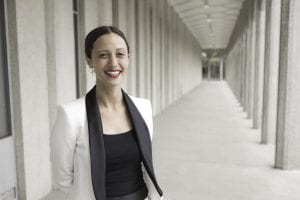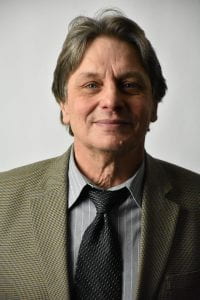In 2019, 12 Humanities Clinic interns came from eight humanities and social science departments including: History, Anthropology, Communications, Sociology, Classical & Modern Languages, English, Library and Information Science, and Political Science; collectively they worked with 18 Detroit organizations and businesses.
Kelsey Jorgensen (Anthropology), Pewabic Pottery, Auntie Na’s House, and Zaman International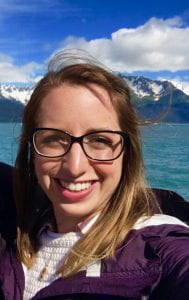
The Humanities Clinic Internship gave me the opportunity to work with three different community partners: Pewabic Pottery, Auntie Na’s House, and Zaman International. With Pewabic Pottery, I digitized their historic archives for preservation, and to enable researchers to access these records remotely. These archives ranged from pottery sale records dating to the early 1900s, to personal correspondence of one of the co-founders, Mary Chase Perry Stratton.
At Auntie Na’s House, I created marketing materials to promote volunteer recruitment for activities such as youth enrichment and donations sorting. My final partnership with Zaman International focused on enhancing their organization and volunteer orientation. Zaman International’s Hope for Humanity Center is the primary location for facilitating several community-based humanitarian projects and housing donations for marginalized women and children. However, it is often difficult for team members to keep track of seasonal donations that are stored out of sight for the rest of the year. To help the team better organize these donations and visualize their layout for event design, I worked on developing my graphic design skills to create a scaled 3D model of the Hope for Humanity Center. I also produced two different maps of the warehouse that showcased both interior and exterior landmarks to help orient new volunteers.
These partnerships improved my flexibility towards applying anthropological skills for a broader job market, and I am appreciative of the chance to work in in the greater Detroit community beyond Wayne State.
Erin Matusiewicz (Classical & Modern Languages/French), Merrill Palmer Skillman Institute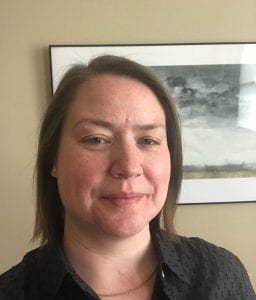
This summer I had the opportunity to work on an exciting project—an exhibition entitled “A Century of Community Making in the History of Detroit: The Vision of Women at the Merrill Palmer Skillman Institute,” which will be on view in spring 2020 at the Reuther Library. My assignment revolved around the origin story of the Institute. I researched Lizzie Merrill Palmer and her vision for a school dedicated to motherhood and home training. I was also charged to look at the people who helped shape the direction of the School—Merrill Palmer Corporation President, Tracy McGregor, and Merrill Palmer School Director, Edna Noble White.
Throughout this process, I was able to apply the skills I have learned during my dissertation to a different setting. Archival research was new for me, and I enjoyed spending much of my time at both Wayne State’s Reuther Library and the Bentley Library in Ann Arbor. Every few weeks our Research Team would gather to share findings and to develop ideas of how to organize the exhibition. I found this to be a stimulating collaborative process vital to exhibition development. Now that the research is nearly complete, I have been invited to stay on to draft exhibition panels. I look forward to synthesizing the large amount of research I gathered this summer to create a wonderful exhibition for viewers. This project has inspired me to learn more about the Detroit institutions, like the MPSI, that have been in my own backyard all this time.
Elizabeth Drake (English), MercyEducation Project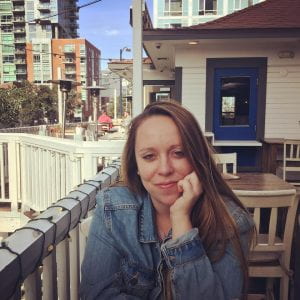
This summer, I had the pleasure of working with the Wayne State University Humanities Clinic as an intern for Mercy Education Project. Located in Corktown, Mercy Ed is a wonderful non-profit that boasts impressive education programs for disenfranchised women and girls in the Detroit area. During my time at MEP, I helped write numerous grants proposals requesting funding for over $60,000 dollars, facilitated the design and creation of a specialized Case for Support, and am leaving behind a “Writing Toolkit” which will serve as a place for people at MEP to pick and choose pieces of writing that I have written to supplement their future projects and proposals.
I am sure that my experience as a graduate student prepared me well for my work with Mercy Ed: not only was I able to apply my well-practiced skill of asking for funding to a more-than-worthy cause, I was also able to incorporate my devotion to feminism and critical-feminist theory to an agency dedicated to female-centric learning ecosystems designed to empower disadvantaged women and girls right here in our community. Mercy Education Project believes in women and girls and goes the distance, every day, to help women and girls access education through their promotion of class, racial, and gender equality. I am so thankful to the WSU Humanities Clinic and Janette and Pam at Mercy Education Project, and Lily Wilson Szlaga for giving me this opportunity. I look forward to continuing my professional relationship with Mercy Education Project in the future.
Rae Manela (History/Library and Information Science), Arab American National Museum, and Community Connections Grant Program in Detroit 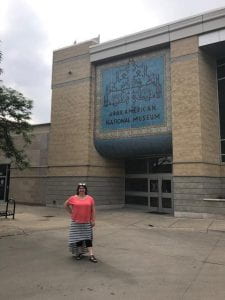
I am so honored to have been accepted into the Humanities Clinic this Summer. I was extra fortunate to be placed with two local organizations; the Library at the Arab American Museum in Dearborn and Community Connections Grant Program in Detroit.
At the Arab American Museum they had a filing cabinet filled with articles, books, and papers which they called the Arab American Research File. A tool such as this sits in the space between libraries and archives. However, it wasn’t very user friendly. An organizational system already existed but there had been a loss of institutional knowledge and researchers seeking information couldn’t easily find what they were looking for. So, I was tasked with making the research file something people could actually use. This was perfect, as a librarian I understood the need for it to be accessible, as an archivist I knew a finding aid needed to be developed, and as a historical researcher I knew what I would want to use to find information. Out of this I reorganized the files, developed an alpha-numeric system which was searchable through the finding aid. I am happy to report that what I created was actually used successfully by a visiting researcher a few weeks ago!
My second placement was with Community Connections Grant Program, a grass-roots micro grant organization working to help young people in Detroit. I used my research and librarian skills to develop an annotated bibliography of books and articles they will be able to refer to when writing articles about the important work they are doing and how micro-grants go a long way to help communities. I also worked on a Tool Kit related to the City of Detroit’s ‘Hope Starts Here’ program which includes information and resources about health, education, pre and neo-natal services, and literacy in Metro Detroit and online. I was also interviewed students and their mentors who partook in Community Connections’ Youth Entrepreneurship Challenge, writing a blog post which will be put on Community Connections’ website. This summer I used and developed my research, writing, interview, and community outreach skills I have developed in the classroom.
Carly Slank (Anthropology), Rebel Dogs Detroit 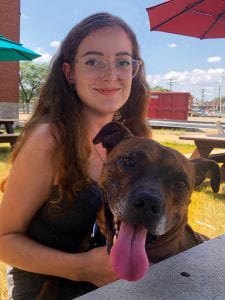
During the summer of 2019, I had the pleasure of working with the Wayne State Humanities Clinic and one of their community partners, Rebel Dogs Detroit. Rebel Dogs Detroit is a foster-based no-kill dog rescue located in Detroit. The nonprofit organization focuses on rescuing dogs that would typically be euthanized in other rescue and shelter environments due to extreme health or behavioral issues. Rebel Dogs Detroit has developed unique methods for rehabilitating and socializing their dogs, giving them a new lease on life and a second chance to find their forever homes.
My work with Rebel Dogs Detroit began with a grant-writing project, during which I was able to draw on my prior experiences applying for grants for my own research. I helped identify appropriate grants for the organization to apply now and in the future. We worked together to produce grant applications for small, supplemental animal welfare grants, and planned for future grant applications. As part of this planning, I helped create a general supplemental body of text that can be used in future grant applications. I was also able to work with Rebel Dogs Detroit to help plan a major upcoming fundraiser that will support the development of a brick-and-mortar shelter in the city. Through this fundraising planning I was able to gain new skills in project development and nonprofit financing while working toward a cause that I truly believe in. Finally, I used my experience in web design and copywriting to help tune up the Rebel Dogs Detroit website to improve their online visibility and aid their fundraising efforts.
At each stage of work with Rebel Dogs Detroit, I was either honing my existing professional skills or developing entirely new skills. I am extremely grateful to the Humanities Clinic for the opportunity to do so while partnering with such a noble nonprofit comprised of people who are passionate about both animal welfare and the city of Detroit.
Sean O’Brien (History), Cathedral Church of St. Paul, and River Raisin Institute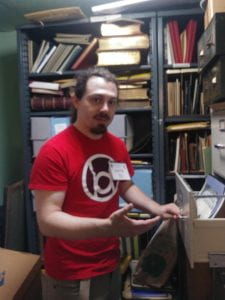
I worked as an intern for the Humanities Clinic over the summer of 2019 with two community partners: firstly, to conduct primary research and documentation for a historical marker at Detroit’s Cathedral Church of St. Paul and secondly, to start a podcast project for the River Raisin Institute in Monroe, Michigan.
Lindsay Toman (Sociology), Stand with Trans
The Humanities Clinic provided me with the opportunity to strengthen my connection between myresearch and role as an advocate by supporting me while I interned for Stand with Trans. I am currently writing my dissertation, which focuses on the medicalization of transgender adolescents. As a feminist researcher, one of my top priorities is to take the information that I learn within the classroom and apply it to the real world in hopes of creating social change for our most vulnerable communities.
Research shows that 50% of transgender youth have attempted suicide. However, this likelihood is decreased if transgender youth are provided with systems of support. The mission of Stand with Trans is to provide the tools needed by transgender youth so they will be empowered, supported and validated as they transition to their authentic life.
Over this past summer I helped Stand with Trans director, Roz Keith, with facilitating the monthly support groups. I got to practice job skills that I do not necessarily get to apply within the classroom, such as program outreach and volunteer coordination. Our main goal was to provide the much needed attention to our volunteers to make sure that they had the resources necessary to successfully facilitate their support groups. I spoke with each facilitator to assess what could be done to help our volunteers, as well as the best route for increasing monthly support group numbers. I truly appreciated this opportunity to gain a deeper understanding of this community from such an amazing group of individuals.
Stacey Deering (Political Science), Wright Museum of African American History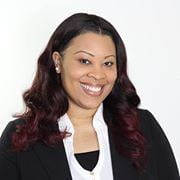
My internship with the Humanities Clinics has been an invaluable experience. Over this twelve-week time span, I was granted the opportunity to serve as a Research Expert with the Exhibits and Curation department at the Wright Museum of African American History (during the 2018 Humanities Clinic, I served as an Executive Public Program Coordinator in the Public Programs Department). I was granted the opportunity to work directly with the CEO, Neil Barclay, and Vice President of Public Programs, Charles Ferrell, on a special exhibit called “Voting Matters.” I conducted research on the history of voting in the United States including voting rights, laws and education. This project correlates with my academic work as an American Government, Policy and Urban Politics Ph.D. student and instructor. This internship opportunity has opened more doors for me, allowing me to network with other policy scholars and researchers, while creating future opportunities for my career in public programming and policy.
Erik Noren (History), Public Humanities Working Group, and Hawk Migration Association of North America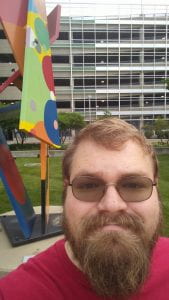
This summer the WSU Humanities Clinic provided me the great opportunity to work with two community partners: the Public Humanities Working Group and the Hawk Migration Association of North America (HMANA). Each of these community partners gave me different responsibilities and a host of varying tasks. Through these internship positions I was therefore pushed to practice and learn new skills, all of which will be useful for my future career.
For the Public Humanities Working Group I was in charge of designing and developing a new Walking Tour of Wayne State’s campus. This project was multilayered, involving collaboration with several different scholars and departments from campus. Through this internship I collected materials about historical architecture, public art, and archaeological findings, and then crafted those materials into 30 short stories that each correspond to a particular location or object from campus that is of significance to the community. Research, writing, and synthesizing information were key to organizing all of this material. From there, I developed the model and tagging system that link these various stories into shared themes of the walking tour.
For my second project with HMANA, I worked with Executive Director, Jane Ferreyra to clean up their large database of almost 2,000 constituent members. This involved learning how to use Little Green Light, a powerful database system for non-profit organizations. Using Little Green Light, I updated HMANA’s individual and organization members into streamlined groups, updated addresses and member activity, and also helped to develop new models that will help future-proof the organization’s database.
Both of these experiences provided via the WSU Humanities Clinic, have been great learning experiences. I have been able to develop both familiar and unfamiliar skills that will help me in my future career as a historian and scholar, while helping Detroit communities.
Keith Brown (Communications), Reuther Library
In journalism, we like to say we write “the first draft of history.” This summer, thanks to the Wayne State University Humanities Clinic internship program, I had the privilege of working with historians at the Walter P. Reuther Library and the new interactive website Rise Up Detroit on a Civil Rights Curriculum Workshop for teachers and librarians.
The Reuther Library is the largest labor archives in North America. Its collection strengths extend to unions and labor, the civil rights and women’s movement in Michigan. Rise Up Detroit (riseupdetroit.org) is a multimedia website telling the stories of Black resistance, Community Building and Black Politics in the Urban North.
After recently launching an educational website on African American History in Detroit, the Reuther Library and Rise Up Detroit hosted a free workshop to train teachers in using this resource to develop innovative curricula and lesson plans to educate, inspire and empower future generations of community leaders.
Working with an experienced and detail-oriented team, I was involved in the planning and promotion of the event; developing media materials (flyer, press release, registration forms, and Wayne State event entries), distribution, email invitations, RSVPs and photography. We incorporated social media, including a “Twitter Takeover” of the Humanities Center account.
Based on the attendance and audience feedback, the Workshop was a resounding success. It was an excellent experience that allowed me to see a unique melding of archival research, technology and critical pedagogy. I sharpened my skillsets and drew inspiration for my research agenda and dissertation-in-progress.
Austin VanKirk (English), Motor Cities National Heritage Area, and K&S Virtual Impact Solutions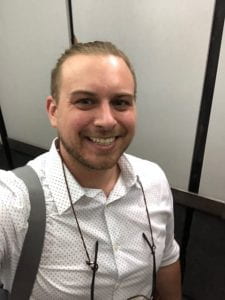
During my time with the Humanities Clinic, I had the opportunity to work with two community partners with diverse needs, MotorCities and K&S Virtual Impact Solutions. During my time working with these community partners, I was able to make use of the skills I’ve gained through other experiences and had the opportunity to build new ones.
In helping to further MotorCities Wayside Signs project, a project devoted to marking historical landmarks and places critical to Detroit’s evolution into the Motor City, I became familiar with the content management system Joomla, a process facilitated by my previous experiences with other content management systems.
At K&S Virtual Impact Solutions I helped create a suite of promotional materials, including a new logo that better spoke to the organization’s mission and goals. After a productive initial meeting with K&S, we developed a plan as for how to move forward. This initial meeting, I believe, was a great learning moment for all of us, with me gaining experience with graphic design consultation and K&S learning more about visual rhetoric and the importance it bears on sending a strong message to audiences.
Mariel Krupansky (English), Michigan State University Community Music School-Detroit
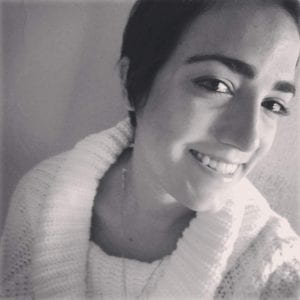 Working with the Wayne State Humanities Clinic as an intern has helped me to form new relationships with local organizations and has given me more insight into what I would like my future career to look like. I was paired with the Michigan State University Community Music School in Detroit (CMS-D), which is a nonprofit that provides free and low-cost music lessons to children and adults in Detroit and neighboring communities and is home to a number of musical events and groups.
Working with the Wayne State Humanities Clinic as an intern has helped me to form new relationships with local organizations and has given me more insight into what I would like my future career to look like. I was paired with the Michigan State University Community Music School in Detroit (CMS-D), which is a nonprofit that provides free and low-cost music lessons to children and adults in Detroit and neighboring communities and is home to a number of musical events and groups.
The first major project I worked on with CMS-D was writing an article that highlighted a relatively new and continuously expanding early childhood education program run out of the organization. The goal of this article was to highlight the real impact this program, aptly titled “Hip-Hop Tots,” was having on local communities in and around Detroit, but the overall purpose of the article was twofold: to serve as an informational article for the general public, so that more families would know about the availability and importance of early childhood music; and to serve as a semi-scholarly piece that would support CMS-D in eliciting future funding for the continuation of Hip-Hop Tots. The experience of writing this article not only exposed me to a new field of study somewhat related to my own (i.e. music education), but also required me to adapt my writing to a wider and more diverse audience.
The second major project I worked on for CMS-D was developing a literacy curriculum for their Verses summer camp. Verses is a free, week-long day camp CMS-D offers every year that highlights the connection between songwriting, music, and literacy. While I have quite a bit of experience with literacy scholarship, and some experience teaching in the field, connecting literacy to music and songwriting was a challenging and rewarding experience. Through this experience, I was able to strengthen my teaching skills and come up with new ideas about my own plans for future research and scholarship at Wayne State University. In addition, CMS-D director, Jill Woodward offered me a job as a Verses instructor, both during the summer camp and in their extended Verses program that runs through the entire school year, where I will be able to continue to develop the skills and knowledge I began by working with CMS-D through the Humanities Clinic internship.
While I have gained many tangible benefits from working as an intern this summer, perhaps the most valuable personal benefit has been exploring career options outside the university. This experience has made me more interested in pursuing a career in the nonprofit sector after I complete my Ph.D. coursework at Wayne State University. I have always wanted to look into other career paths besides university professorships, but have not, previous to this experience, had the opportunity to explore that career path. It is comforting to know that I am interested in other options, and that I am beginning to develop a network of professional relationships through my internship with the Humanities Clinic.

